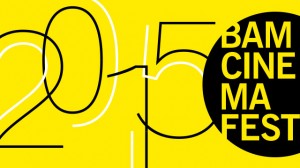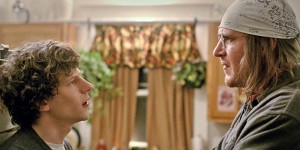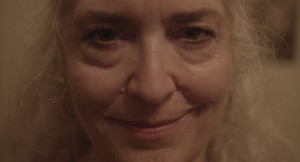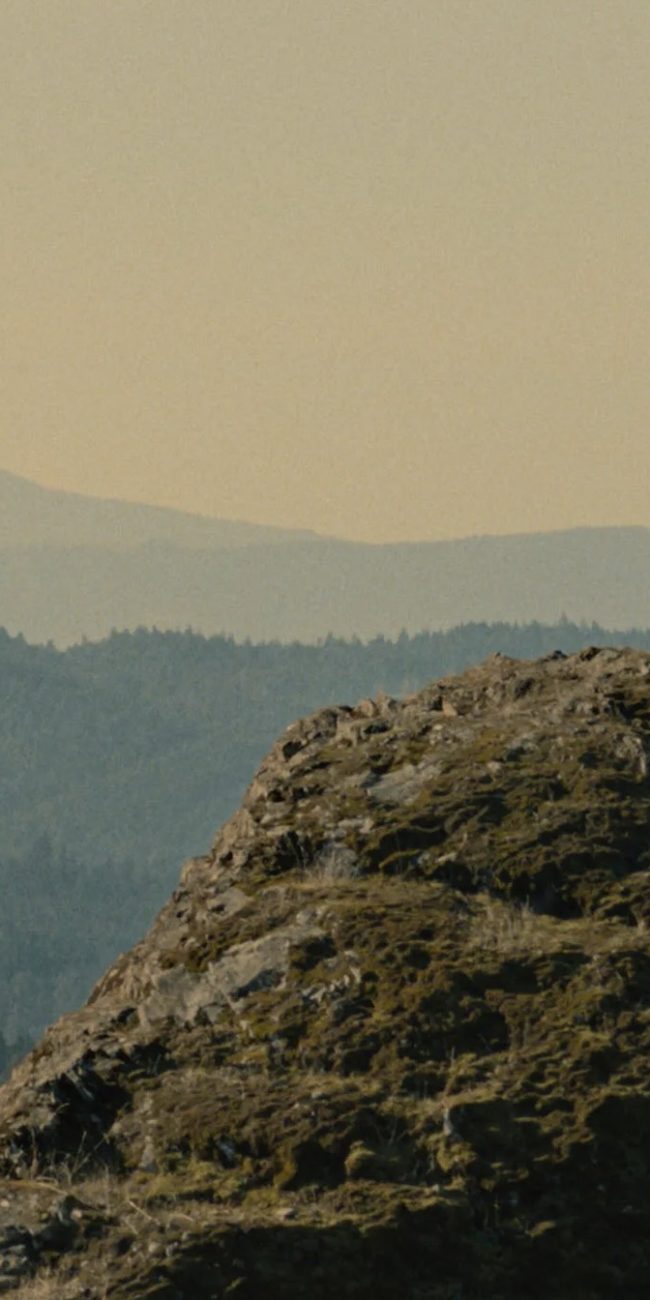BAMcinemaFest 2015: The End of the Tour & Krisha
(The Brooklen Academy of Music’s (BAM) annual Cinemafest kicks off today in, you guessed it, Brooklyn and runs until June 28. As always, there’s a fairly amazing slate and our own Susanna Locascio took this opportunity to double-dip reviews of two films that left a major impression)
 The End of the Tour (James Ponsoldt)
The End of the Tour (James Ponsoldt)
I don’t know much about David Foster Wallace. I was still in high school when Infinite Jest was published, and by the time I was old enough to read it for whatever reasons I didn’t. I’ve read some of his journalism and was tempted, but Jest is such a brick-heavy commitment of a book. After seeing James Ponsoldt’s The End of the Tour I bought Infinite Jest and began reading, and I think that’s a testament to what a lovely tribute film Ponsoldt has made. To be clear, The End of the Tour is not a biopic. In fact the film was made without the support of Wallace’s family or literary trust, who released a statement saying they never would have allowed the film to happen and “do not consider it an homage.” Technically The End of the Tour is an adaptation of journalist David Lipsky’s book Although of Course You End Up Becoming Yourself. Lipsky was hired to write an interview on Wallace for Rolling Stone magazine, and spent several days accompanying the writer at the end of his Jest book tour. For a reason I couldn’t dig up the interview was never published in the magazine, but Lipsky collected the transcripts and published the book after Wallace’s death in 2008. Playwright Donald Margulies then wrote the script based on Lipsky’s book (I’m sure the legal file on this film is immense – it’s a tapestry of adaptation and translation). I can see why the keepers of Wallace’s legacy would be anxious about the film, though none of us can say whether or not Wallace would have allowed or appreciated the movie. I can see why Ponsoldt took the risk – to say the film is about David Foster Wallace is a superficial summation. In one epic, unspooling conversation set in motion, The End of the Tour is about genius, friendship, jealousy, loneliness, creation, paralysis, fame, depression, joy, transcendence, and our very human dependence on the sublime and impossible promise of all of these things.
To be honest, I was most interested in seeing The End of the Tour because of director James Ponsoldt. With Smashed, The Spectacular Now, and now Tour, Ponsoldt has built quite a track record of thoughtful, intimate films about love. They are emotionally warm without being corny or sentimental, grounded in reality and a bruising kind of honesty. They are also built on roles actors want to play. Ponsoldt’s films attract great casts, but the performances are also surprising, slightly against type, interesting, and nuanced (it’s not surprising that Ponsoldt’s next project is a significant leap – he’s adapting Dave Eggers’ sci-fi novel The Circle with Tom Hanks and Emma Watson attached). While Jesse Eisenberg is wonderful as the journalist David Lipsky, it’s Jason Segal as David Foster Wallace who really floored me.
Though he’s made his name in comedy, even back in the Freaks and Geeks era Segal had a quiet melancholy sweetness, which under Ponsoldt’s direction expands to fill the screen in Tour. Segal has insisted his performance is not an impression, but when I watched some videos of Wallace I couldn’t believe how fully Segal seems to have embodied the writer, from the lumbering, athlete physicality (Wallace was a tennis player) to the bobbing and weaving of his conversations. Wallace seemed fundamentally uncomfortable with attention (or at least extremely suspicious of his own desire for it), and he responds to many of Lipsky’s questions by answering then volleying “You?” right back at the journalist. It’s an effective technique in the film, and from what I saw an accurate representation of what conversation with Wallace could be like. One of my favorite examples is from a Charlie Rose interview when he asks Wallace about his piece on David Lynch, and Wallace launches into a detailed analysis of the director, down to distribution strategies for his films, then wraps it up with a backtracking, “and this may be entirely false, I mean I’m not a film scholar.”
The End of the Tour starts in New York City with Lipsky celebrating the publication of his first novel until Infinite Jest casts a monumental shadow over the literary world. His girlfriend (Anna Chlumsky) presses Lipsky to read Jest, and he then pitches his boss at Rolling Stone (Ron Livingston) to go interview Wallace. Lipsky is not just a journalist interviewing a famous writer, he’s a writer interviewing a newly famous and successful anointed genius writer, and much of the story’s tension arises from both men grappling with this reality. Wallace is disarmingly charming and accessible, bringing Lipsky into his life in a kind of dizzying bear hug of companionship. He treats Lipsky more like a friend and equal, and Lipsky tries his best to live up to the opportunity. But they are not friends, Lipsky is there to interview Wallace, and, hiding behind his role as journalist, Lipsky studies Wallace, even peeking into his medicine cabinet for clues. It’s inevitable that this power dynamic will create tension between them, but it’s also driven by Wallace’s somewhat “aw shucks” response to his fame and talent.
Tension builds when the two men fly to Minneapolis for the last reading at a bookstore, and women enter the picture. Lipsky and Wallace fight like two schoolboys over mistaken flirtations with girlfriends and ex-girlfriends, and when they land back in Illinois Lipsky can’t find where he parked the rental car at the airport. This small humiliation deftly leads into the larger humiliation, and on the drive home Lipsky angrily confronts Wallace about his “social strategy.” The bandanas Wallace wears, his love for his dogs, his childlike addiction to television, bad movies, candy, “pop” – Lipsky misunderstands these as affectations, rather than a man fighting to feel normal. Wallace is so intelligent and witty it’s easy to see why Lipsky doesn’t believe him (Wallace’s dismissal of New York as the “enormous hiss of egos in various stages of inflation and deflation” is classic). But we of course know what Lipsky doesn’t – that Wallace will commit suicide over a decade later. The film honors this by making a poignant shift, and Wallace begins to open up to Lipsky about his depression. But despite this intimacy and Wallace’s overtures of friendship a distance remains. Grasping but never quite reaching his hero, Lipsky is left to be a voyeur and scavenger. Wallace haunts the film like a ghost and a remarkable memory of greatness.
The End of the Tour is the kind of film that looks simple but is incredibly difficult to do well. I really like that Ponsoldt doesn’t show off – he knows who the star is here. But he manages to not only dramatize what is essentially a long interview but also to make it cinematic. The choices are subtle but potent. Ponsoldt is careful about pacing and keeps the characters physically moving, from Wallace’s modest ranch house to diners and convenience stores, cars, airplanes, hotel rooms, and even the Mall of America (songs by R.E.M., Pulp, The Magnetic Fields, and Tindersticks really help). Small roles are brilliantly cast, especially Joan Cusack as a chirpy bookstore owner immune to Wallace’s erudition. Gerald Sullivan’s precise production design fills in Wallace’s world, drawing us in almost as companions to Lipsky – when we finally see Wallace’s writing desk it’s a revelatory moment. There is actually a kind of acceleration of emotion as the film ends. Most of the film takes place in the wan blue-gray winter light, a pallor that fits the tone of quiet melancholy, but the literal end of the tour lets in some sunlight. Despite the sense of loss, the final image of David Foster Wallace that Ponsoldt leaves us with is one of joy.
Krisha (Trey Edward Shults)
A BAMcinemaFest honorable mention has to go to Trey Edward Shults’ Krisha. This crazy, fascinating feature debut plays like Vinterberg’s The Celebration set at a Texas Thanksgiving. One of those SXSW finds, the film won this year’s narrative grand jury prize, and rightly so. The film is about Krisha, a complicated woman who returns for the holiday to try to reconnect with her estranged family, and the chaos this visit unleashes. As the day progresses the home seems to twist and turn like a mirrored fun house, revealing shards of the past and increasingly dark and devastating truths, and though she’s at the center no one suffers more than Krisha. Shults makes the most of his limited canvas and shows a masterful understanding of technique. The film is driven by expressive directing – the spinning camera, the prickly, plinking, percussive score, lighting that carves faces out of shadows. The film threatens but never tips over into melodrama. Incredibly, Shults also stars in the film and cast members of his own family, including his aunt Krisha in the titular role, and his mother Robyn and her sister Victoria. Krisha Fairchild is pretty great as Krisha, but Bill Wise as Trey’s uncle is on fire. An actor with a long list of credits (including Boyhood and Computer Chess), according to the internet he is “perhaps best know for his anime dubs.” After Krisha I hope to see more of Bill on screen. And we’ll definitely see more of Trey Edward Shults.
— Susanna Locascio













